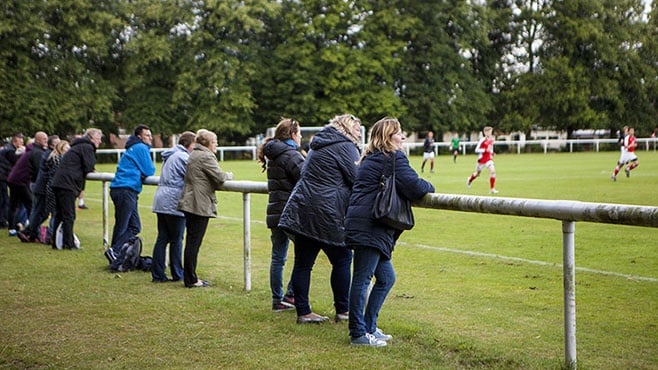As the half-time whistle blew, Michael Leech gathered his team for a talk. All of his players, only eight-years-old, listened while he lifted their spirits up before the second half.
Midway through the talk, a player’s dad stormed over to the team, pointing aggressively at the coach and threatening violence if he didn’t let his son play in the position he wanted him to, in front of all the young boys.
“I was unlucky to have a problematic set of over-demanding parents. There were unrealistic expectations of some parents who wanted the team to win.” said Michael Leech, a 55-year-old former under-8s football coach, “Others let their child play for social interaction and are not fussed if the team wins or not. At that age, it’s about fun and learning, not winning.
“It’s a lot harder than people realise and having football expertise is only half the battle. Having to explain why you’re not playing someone’s child or explain tactics all the time was challenging.”
In 2018, the FA did a survey with over 37,000 participants, with one of their main findings being unacceptable behaviour by overbearing, competitive parents.
Ninety one percent of survey participants believed that disrespect in any form did not belong in the game.
In a bold move to tackle this issue, the FA introduced a Respect programme that is targeted at challenging unacceptable behaviour in football. Respect lines have been positioned at the sidelines of every pitch, serving as a boundary that no parent, spectator, manager or coach can cross.
But it’s not just the FA tackling the problem. The football platform No1Fan.club, founded by Marcia Lewis and Kat Chidiac, was created to support parents in navigating the dynamics of youth football.
“A parent’s own upbringing and experiences with football can play a significant role in shaping their approach. Many parents may be acting based on their limited knowledge, beliefs, and lack of self awareness, rather than wanting to intentionally harm their child’s well-being.” said Marcia Lewis.
“No1Fan.club provides a space for parents to explore different perspectives, gain wisdom from others, and encourage more constructive approaches for parenting within football.
“Involving a greater understanding and support within the football ecosystem itself is also crucial to supporting parents and safeguarding the mental health of young players.”
Marcia is a football parent herself, and has witnessed firsthand the difficulties involved in raising a young footballer.
“As a parent who has been involved in youth football for 14 years, supporting my son’s journey from grassroots, to becoming a young professional at Arsenal and playing for England youth, I’ve seen the impact that parental over-involvement as well as under-involvement can have.
“It’s natural for parents to want to be involved and guide their children, but it’s important to find the right balance and to be aware of how our actions and behaviours can affect our children’s experiences and mental well-being.”
In a study conducted by the FA, young players across the country were asked: ‘Why do you play football?’ Their responses were positive, with answers revolving around loving the game, being able to play with friends, and the idea that it’s not all about winning.
On a recent episode of The Rest is Football podcast, co-host Gary Lineker discussed the issue of pushy parents and what it can do to a child. He says: “You’ve got to be pretty chilled as a parent and not be too pushy. I never said a word when my kids played.
“There was a dad on the sidelines at one of my sons’ games, shouting dog abuse at his own son. At the end of the game, his dad picked him up by the scruff of the neck and said he’d never make it if he played like that. I thought, ‘he’s never going to make it anyway’. My advice is just let them play.”
Only 180 out of 1.5million boys will be signed by Premier League teams in youth football, and 50% of academy players are released or leave before they turn 16.
The desire for some parents to see their child pursue a professional football career can be complex. But for Joe Morley, son of former professional player Tony Morley, football came naturally to him rather than a pressure pursuit from his dad.
“I didn’t feel under any pressure to play football, it just came naturally and I got into it.
“You can argue that there are some people who are always going to compare me to my dad, but at the end of the day, he played more than fifty years ago and times have changed. We are two completely different players.”
Joe, who manages his own coaching business, Morley’s Coaching, recalls a supportive yet opinionated father figure.
“My dad would never be shouting anything on the sidelines during the game,” Joe shares, “But he definitely gave me his opinion on how I played afterwards.
“There were countless hours on the field with just me and him, which ended in heated arguments, but he one hundred percent helped me and still does.”
Tony Morley is best known as a former Aston Villa player, and he also won six caps for England. The father-son duo always had a healthy attitude to football when Joe was growing up: “I always feel like Joe had his own path and was following that. Yes, we played the same sport, but everyone’s path is different and unique. But I was a harsh critic, one hundred percent.
“Our relationship didn’t change much, but as he got older and started to understand the game more, we could speak and do different things.”
The discussion of the topic of balancing pressure and passion can really show the influence a parent can have on their child and football should just be a source of enjoyment.
Parents play a significant role in their child’s motivation, so we should be able to create a domain where young players can pursue their own love for the best game in the world.

